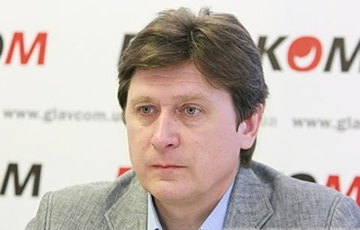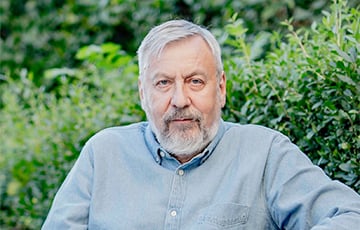Volodymyr Fesenko: Surovikin’s Resignations Brings On Another Intrigue
2- 23.08.2023, 20:31
- 24,722

The situation among the Russian special services is tense.
Head of the Kremlin Putin secretly replaced the disgraced General Sergei Surovikin, who headed the Russian Aerospace Forces, with General Viktor Afzalov. Why is there no official information about this decision? What fate can await Surovikin?
Well-known Ukrainian political scientist, head of the Penta Center for Applied Political Research Volodymyr Fesenko answered these questions to the Charter97.org website:
— In this case, I will refer to Russian sources, because it’s there where the fate of Surovikin (where he disappeared, why nothing is known about him) caused a certain stir. Two months have already passed since the moment of the Prigozhin rebellion, and it was Surovikin, perhaps the only noticeable and involved subject of those events, whose fate was unclear.
Some Russian sources, in my opinion, quite figuratively and accurately described why nothing was said about this general. The version is as follows: the Kremlin began to creatively use the Chinese experience. This refers to the recent situation, typical of China, when the Minister of Foreign Affairs, similarly, disappeared from the public sphere for a month. No one knew what had happened to him, and then a decision appeared about his resignation.
The person who held this post earlier, Wang Yi, became the Minister of Foreign Affairs. He is in charge of foreign policy in the party, and now he has returned to the post. The former minister disappeared and no one knows what happened, why he was removed — silence. There is something similar in the story of Surovikin.
If we take a more serious look at why such a tactic of silence is used, it seems to me that this is due to the fact that Putin avoids conflicts with people who have a power resource. He did not go into direct conflict with the “Wagnerites” and Prigozhin himself, although they committed a rebellion. Although not against Putin, but against Sergei Shoigu, and still he is afraid to arrange reprisals against them, because it is not known how this could end. What if they start to resist, and get support.
— How would you assess the mood among the generals of the Russian Federation?
— The mood in the general environment is very ambiguous. As it turned out, Prigozhin had many supporters, albeit implicit ones. Most importantly, there were people who did not hide their negative attitude towards Shoigu and Valery Gerasimov. Such people appeared, for example, General Ivan Popov, who was removed from command of the 58th Army when it became obvious that he, too, was becoming a popular figure. He was sent to Syria, to play it safe. They didn’t remove him, didn’t dismiss him, but sent him away.
Apparently, it’s a similar story with Surovikin. I repeat, to put him in jail is to make him a victim. How to repress? What if it causes discontent among the generals? So Putin decided to keep silence, intrigue, avoiding certainty.
By the way, this was also a test of how people would react to this decision: defend him, demand his rehabilitation, demand to demonstrate him to the public. Or this tactic will work, and Surovikin will slowly be forgotten. Then it will be possible to send him either to resign, or to some insignificant position, where he will have no influence. This is such a soft way of hushing up a personal problem so as not to arouse discontent and conflicts in the military environment. In my opinion, this is the most logical explanation for the silence around Surovikin.
Interestingly, the information about Surovikin has brought on another intrigue.
— Which one?
— It concerns another person. The fact is that the first news about the dismissal of Surovikin from the post of head of the Military Space Forces was reported by the “foreign agent” Venediktov and the pseudo-disgraced Sobchak. This also caused bewilderment among many: how is that, there is no Dmitry Peskov?
Here we are talking about Surovikin, about whom nothing was known for two months, and then there was unofficial information about his resignation. Now, unexpectedly, out of the blue, information about the disappearance of Peskov appeared. The press secretary of the President of Russia has not been seen for almost a month. He's probably on vacation, but still. This tactic of silence immediately creates some intrigue.
— How now, after a few months, do you assess the consequences of Prigozhin's rebellion?
— By the way, the level of support for Yevgeny Prigozhin among Russians has decreased, but remains quite high. According to various sources, about a quarter of Russians continue to sympathize with him. I will say that this is a worrying trend for the Kremlin. Apparently, this is also one of the reasons why Prigozhin is left “in orbit” and his loyalty to Putin is shown. This is done in order to maintain, shall we say, social stability.
The most important influence of the Prigozhin rebellion was manifested not so much at the mass level, on ordinary Russians, but on the elites. The elites saw that it was possible to change power in this way.
The scenario, which was considered unlikely and even fantastic, turned out to be realizable. As the well-known Russian political scientist Valery Solovey said, for example: “What kind of a palace coup is possible if these people have no access to the palace?” It turned out that a rebellion attempt could be made by people from Putin's team, who have access not only to the palace, but also to their own power resources.
I think this has become a sort of a precedent. The elites saw that the situation could change very unexpectedly, quickly. Everyone noticed that when the rebellion occurred, Putin was in shock. The problem was solved by other people.
This had an impact not only on Russian elites, but also on Putin's partners abroad. In particular, in China, Iran and some other countries.
All this does not mean that tomorrow there will be some new coup in Russia (although there are many assumptions about this). I note that the contradictions that emerged during this period under Prigozhin have not been resolved. There remains the problem of dissatisfaction with Shoigu and Gerasimov in the military environment and among the generals. If they don't, who knows. There may be some new attempt, if not rebellion, then internal conflicts. There are also contradictions between various Russian power structures.
Many did not like the strengthening of Zolotov and the National Guard. Contradictions remain between the FSB and the military, the FSB and the National Guard. These are potentially dangerous issues. Russian politics at the elite level has become less consolidated. It’s like a minefield right now. Everyone expects that somewhere it might explode, but no one knows where.










